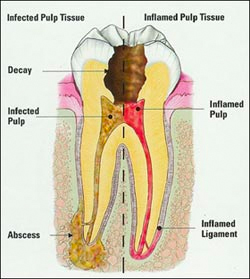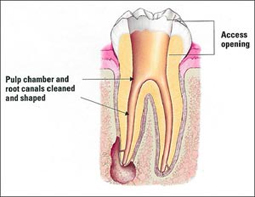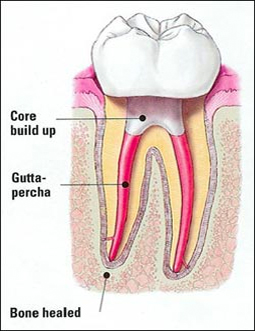What is a root canal therapy?

When a tooth pulp is damaged, root canal therapy is a process where the tooth’s internal contents are cleaned out, the inside of the tooth is sterilized and then sealed with a rubber material called Gutta Percha. This treatment can save your natural tooth and prevent the need for dental implants or bridges.
At the center of your tooth is pulp. The pulp is a collection of blood vessels, nerves, and connective tissue that help to initially build the surrounding tooth. Infection of the pulp can be caused by trauma to the tooth, deep decay, cracks and fractures, or repeated dental procedures on the tooth. Symptoms of the infection can include swelling around the tooth, sensitivity to temperature, discomfort when chewing with the tooth, and spontaneous pain. If you experience any of these symptoms, your dentist may recommend root canal therapy to eliminate the diseased pulp.
How is a root canal performed?

Dr. Saade will anesthetize your tooth to eliminate discomfort. The injured and/or diseased pulp is removed and the root canal system is thoroughly cleaned and sealed. This treatment may be completed in one or more visits depending on the treatment required. Success for this type of treatment ranges from 60 to 100 percent depending upon the severity of disease. If your tooth is not amenable to endodontic treatment or the chance of healing is unfavorable, you will be informed at the time of consultation or when a complication becomes evident during or after treatment.
What happens after treatment?

A permanent restoration should be commenced approximately 1 week after treatment. Any delay in the placement of a permanent restoration can exert a negative influence on the outcome of root canal therapy. A decision about what type of restoration is necessary to protect your tooth will be made, but in most circumstances a full coverage restoration (such as a crown) will be recommended.
